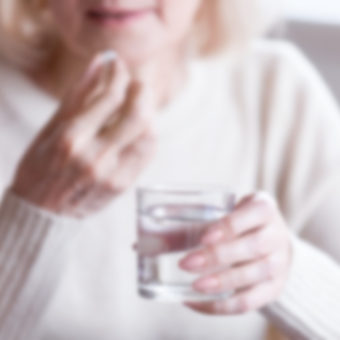

As you get older, it’s no secret that medication management can become increasingly complex. The majority of older Americans take multiple medicines each day, and may sometimes receive prescriptions from different doctors. Additionally, changes in the body commonly associated with aging can affect how drugs are absorbed and processed. From managing a medication schedule to properly disposing of medicines, there are several steps that seniors can take to help maintain their health and safely manage a regimen that includes multiple medicines.
Keeping a written record of the essential information about each medicine you take can help you keep things straight and decrease the chances of making a mistake. The FDA has a template that you can print out and use to create your medicine record. Depending on how you like to keep track of your medication schedule, you can also use this record as a checklist: next to each medicine and time, leave a space to check off when you’ve taken that dose. Include all prescription and over-the-counter medicines as well as any vitamins or supplements you’re taking.
Not only is a record a great way to help you keep track of which medicines you take, when to take them, and why; it can also be a useful tool to bring along with you to your medical appointments. Having a written record on hand can help ensure that your primary care doctor and any additional healthcare practitioners or specialists you visit have a complete and detailed understanding of everything you take to manage your health.
Reading the label and supplementary printed information before taking any medicine is critical: it can help you to take the correct dose, recognize side effects, and understand when to speak with your doctor. Certain prescription medicines are packaged with a printed Medication Guide that provides additional details on the product’s safe handling (read more on Medication Guides here). All over-the-counter medicines feature the familiar Drug Facts label containing the most important information about the product in an easy-to-understand and simple format (more on the Drug Facts label here).
Certain physical changes associated with aging can affect the way that medicines are absorbed and broken down by the body, potentially increasing the chances of drug interactions. The warnings and interactions indicated on the label or Medication Guide can help to prevent you from taking a medicine that may cause complications when paired with something else that you’re taking, or even a food that you eat.
If possible, arrange to have all of your prescriptions filled by the same pharmacy, particularly if you’ve been prescribed medicines by multiple healthcare providers. This can help your pharmacist to keep an electronic record of everything that you’ve been prescribed, allowing them an opportunity to double-check for any medicines that may interact harmfully with one another. It’s also important to remember that pharmacists have the clinical expertise needed to answer any questions you may have about your medicine and can help complement (or reiterate) the information that your physician provides. Pharmacists also tend to be easy to reach – all you need to do is stop by (or call) your local pharmacy to speak with one!
Your pharmacist is not only an excellent resource for any questions you may have about your medicines, but may also be able to provide supplementary information (for example, printed Medication Guides upon request) and tools that may make medicine adherence easier for you (such as large-print labeling if your eyesight is impaired).
Review the contents of your medicine cabinet at least once every six months for any products that are expired or no longer needed. Take an inventory of your medicines, check expiration dates, and visually inspect products you haven’t used in a while for signs of spoilage (if they’ve changed in texture, color, or smell, it’s likely time to dispose of them). Then, visit our Kiosk Site Locator to find a safe and secure kiosk site near you. Kiosk sites are often located in your local pharmacy, health care facility, or law enforcement facility. They are an anonymous and convenient way to securely dispose of unwanted, unused, or expired medicines.
If it’s difficult for you to easily visit a Kiosk Site, in-home disposal is a safe and effective option for most types of medicines, if you follow your local regulations and take the proper precautions. Review our “Do’s and Don’ts of In-Home Medicine Disposal” before disposing of any medicines at home.
When you’re taking multiple medicines, keeping products that are no longer needed can lead to clutter and confusion. Plus, pills, capsules, and liquids can spoil and are not guaranteed to be effective – or even safe – past their expiration date. Proper management and disposal of drugs from households may help to combat drug misuse and accidental ingestion and poisoning.
—
Due to possible disruptions associated with COVID-19, kiosk access to and operating hours at the listed kiosk locations may be impacted. If you have questions about a kiosk site, including current kiosk access, what can be disposed of, and hours of operation, contact the kiosk site directly. If you are not able to visit a kiosk and have immediate disposal needs visit the FDA website for additional guidance and be sure to comply with all applicable federal, state, and local legal requirements.

The OTC Drug Facts Label ~ What do your aspirin, cough syrup, and seasonal allergy treatments have in common? They…
Read More
Take your treatment plan seriously ~ Do you fill all your prescriptions on time? Do you skip doses or take…
Read More
How to Keep Everyone Safe ~ As a caregiver, you’re already juggling a lot. When you add household medication to…
Read More
Make it a habit to check your medicine cabinet ~ Ah, spring cleaning. That annual ritual when you throw open…
Read More